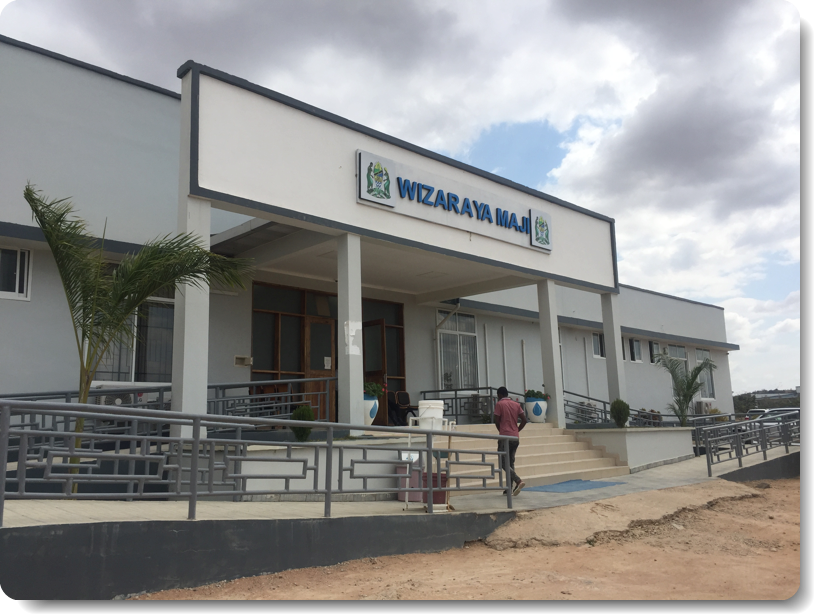Institutional Framework
In view of the multi-sectoral, demand-driven nature and in order for the project to become a role model to establishing mechanisms for implementation of multi-sectoral programmes on climate adaptation in Tanzania, a close coordination and cooperation with multiple stakeholders is imperative.
At the national level, the following key institutions are involved:
- Ministry of Water (MoW) is the PEA on behalf of the United Republic of Tanzania.
- Project Coordination Office (PCO) within MoW: responsible for the overall coordination and implementation of the Project, leads all required interactions and interlinkages with different Tanzanian partners related to the Project at the national level as well as with the sub-national Simiyu bulk water supplier, the WSSA in Bariadi (BARUWASA) and the possibly to be established WSSAs at Lagangabilili and Nyashimo. MoW, the WSSAs and the Simiyu bulk water supplier shall cooperate closely during the preparation and implementation of the Project.
- Steering Committee (SC) to be established and composed by representatives of the following ministries: Ministry of Agriculture (MoA), Ministry of Livestock and Fisheries (MoLF), Ministry of Health, Community Development, Gender, Elderly and Children (MoHCDGEC), Vice President’s Office (VPO) and President’s Office – Regional Administration and Local Government (PO-RALG). The Steering Committee will be advised by a Technical Committee (TC) to be composed of representatives from PCO, PMU, MoFP, UWSSAs, Civil Society Organizations, LGAs, all other line ministries and KfW.
- Rural Water Supply and Sanitation Agency (RUWASA): Newly established (July 2019) Government Executive Agency, working under MoW. Responsible for the development and sustainable management of water supply and sanitation projects and water service
At the local level, the following key institutions are involved:
- The Regional Secretariat of the Simiyu Region supports the Local Government Authorities (LGAs) in all their functions and oversees and consolidates their activities implemented on the local level under the Project. It hosts the Project Management Unit (PMU) which will coordinate the community-driven approach at the local LGA-level.
- Project Management Unit (PMU): Regarding the coordination of the community-driven approach at the local level (e.g., rural sanitation, public toilets, climate-smart agricultural practices), MoW and the Regional Secretariat are supported by a dedicated PMU which will be hosted and staffed by the Regional Secretariat of the Simiyu Region, plus secondments from the key line ministries. The PMU reviews the adherence of measures proposed by communities to the agreed criteria of the Project.
- The Local Government Authorities (LGAs) will be involved in the implementation of the measures at the local level, such as mobilization of local user groups, support in the development of proposals for climate-adapted community measures, submission of annual work plans, budgets and procurement plans to PMU, procurement of goods, works and services, supervision and approval of local construction works.
- Simiyu Bulk Water Supplier (to be established): Owns, operates and maintains the water treatment plant, pumping stations, transmission mains, the command reservoir and primary reservoirs along the pipeline.
- BARUWASA (Bariadi WSSA, existing), WSSAs for Nyashimo and Lagangabilili (to be established): Own, run, operate and maintain urban water distribution infrastructure, sludge digesters and sludge exhauster trucks.
- Community based Water Supply Organizations (CbWSOs, to be established): Enter into off-taker agreements for drinking water with the Simiyu bulk water supplier and arrange sludge collection with the WSSAs; supply water and run sanitation facilities in clusters. The number of CbWSOs to be established depends on the selection and clustering of villages.
- Community based User Associations (to be established): Organisations established by communities; develop community development plans and submit proposals to LGAs; own, manage, operate and maintain rural infrastructure, sanitation and agriculture. The number of Community based User Associations to be established depends on the selection and clustering of villages.











